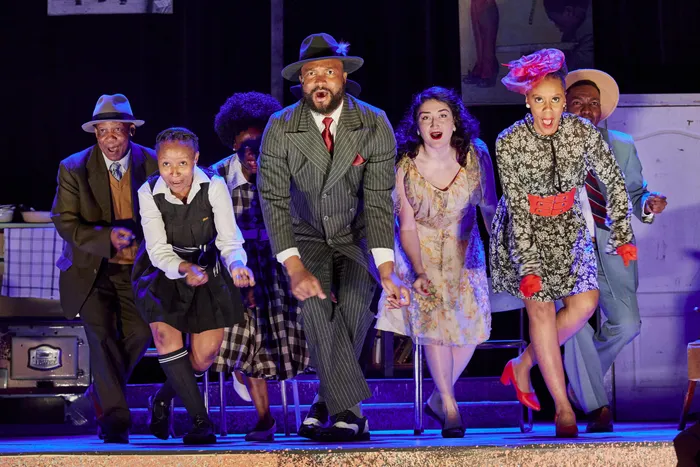Fresh but original 'Sophiatown' musical drama still wows and resonates with audiences
ENCORE!

One of the scenes from the play 'Sophiatown' that takes audiences back in time to 1950s South Africa.
Image: SA State Theatre Media Team
With only a couple of days left before the final curtain falls in the current season of Sophiatown – one of South Africa’s best-known musical-drama classics – theatre lovers will be pleased to learn that it will make another return at the SA State Theatre in Pretoria in August.
And the popular play, which has been playing to full houses since opening on May 5, will also move to Durban’s Playhouse after the August season, said State Theatre Artistic Director Aubrey Sekhabi.
“We’re excited to announce that the production will return for a second season in August, and thereafter head to the Playhouse in Durban. These next phases will allow us to continue building momentum and expanding access to new audiences,” he said.
The play, first penned by the Junction Avenue Theatre Company and Malcolm Purkey in the 1980s through the workshopping method drawing from the community’s real experiences, is directed by the award-winning Sekhabi.
With its message of “memory is not just nostalgia — it is resistance”, the production resonated with the audience, drawing them into the past world where jazz and anti-apartheid struggle themes combined.
“The audience reception has been phenomenal — deeply engaged, emotionally responsive, and often giving standing ovations. It's clear that the production has struck a meaningful chord with the public, and we are humbled by the continued support and enthusiasm,” said Sekhabi.
Set in the 1950s in a Johannesburg neighbourhood teeming with creativity and cultural fusion, Sophiatown tells the story of a group of politically-engaged black South Africans who, in a courageous act of resistance, welcome a white Jewish woman named Ruth Golden into their communal home.
The play unfolds with wit, satire, music, and poignancy, capturing the essence of a community on the brink of erasure — torn apart by apartheid, yet fiercely determined to live, love, and resist. More than a setting, Sophiatown — fondly known as Kofifi — is the soul of the performance, pulsing through every note, every monologue, every moment of silence.
At the helm of this deeply South African narrative is Sekhabi, who has remained devoted to the original script while infusing the work with refreshing musical and visual elements.
“This is a South African classic. We must not shy away from doing our classics again and again,” said Sekhabi.
“Artistically, the production has already succeeded. It’s a fully-fledged musical now, and socially, it contributes massively to education across the country.”
Under his direction, a formidable cast brings the spirit of Sophiatown to life. Sandi Dlangalala gives a charismatic and thoughtful performance as Jakes, the narrator and journalist. Gaby Georgeson portrays Ruth Golden with heart and grace, embodying the idealism and vulnerability of someone crossing boundaries with curiosity and courage.
Sindisile “Nyoni Lenhle” Nkuna breathes fire into Mamariti, the strong matriarchal figure whose love is as fierce as her wisdom.
Terrence Ngwila’s portrayal of Mingus commands attention — and at times laughter and tears in equal measure.
Bringing playful energy and comic timing to the role of Fahfee is Tshallo Chokwe, while Mncedisi Hadebe silently stirs the audience as Charlie.
Live music wraps around the performance with the band acting like a second, powerful narrator. Oupa “Poy Poy” Makhubela on guitar, Khutso “Shalom G” Nkwana on saxophone, and Suprise Mshwana on drums form a seamless ensemble that transports the audience straight to the smoky shebeens and buzzing streets of 1950s Johannesburg.
Musical director Zakhele Mabena made sure not to merely provide an accompaniment but do his part of the storytelling through sound.
The response from audiences has been overwhelming. Princess Sechele notes that “the audiences are engaged, they laugh, they cry, they sing—they see themselves in the characters.”
“It still feels like the first season. Every time I step into Mamariti’s shoes, I am reminded of how powerful our stories are,” she said.
At its core, Sophiatown still matters because it still mirrors the truths of South Africa today. The themes of racial displacement, economic struggle, community tensions, and love across boundaries remain deeply relevant.
“We’ve stayed loyal to the script. No ad-libs, no additions,” Sekhabi insisted. “That discipline has made the storytelling even stronger.”
Gaby Georgeson echoes this sense of purpose: “Ruth is fearless. She reminds us to go beyond our comfort zones, to listen, to understand.”
